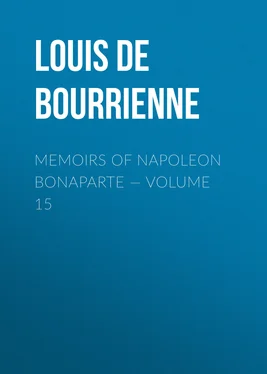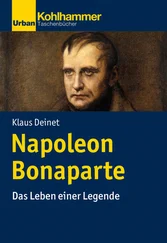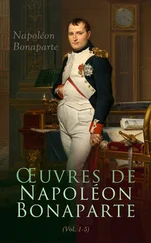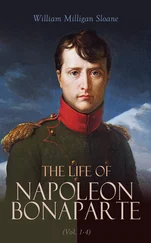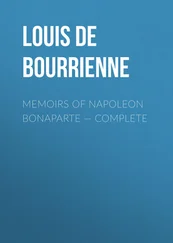Louis Bourrienne - Memoirs of Napoleon Bonaparte — Volume 15
Здесь есть возможность читать онлайн «Louis Bourrienne - Memoirs of Napoleon Bonaparte — Volume 15» — ознакомительный отрывок электронной книги совершенно бесплатно, а после прочтения отрывка купить полную версию. В некоторых случаях можно слушать аудио, скачать через торрент в формате fb2 и присутствует краткое содержание. Жанр: Биографии и Мемуары, История, foreign_edu, foreign_antique, foreign_prose, на английском языке. Описание произведения, (предисловие) а так же отзывы посетителей доступны на портале библиотеки ЛибКат.
- Название:Memoirs of Napoleon Bonaparte — Volume 15
- Автор:
- Жанр:
- Год:неизвестен
- ISBN:нет данных
- Рейтинг книги:5 / 5. Голосов: 1
-
Избранное:Добавить в избранное
- Отзывы:
-
Ваша оценка:
- 100
- 1
- 2
- 3
- 4
- 5
Memoirs of Napoleon Bonaparte — Volume 15: краткое содержание, описание и аннотация
Предлагаем к чтению аннотацию, описание, краткое содержание или предисловие (зависит от того, что написал сам автор книги «Memoirs of Napoleon Bonaparte — Volume 15»). Если вы не нашли необходимую информацию о книге — напишите в комментариях, мы постараемся отыскать её.
Memoirs of Napoleon Bonaparte — Volume 15 — читать онлайн ознакомительный отрывок
Ниже представлен текст книги, разбитый по страницам. Система сохранения места последней прочитанной страницы, позволяет с удобством читать онлайн бесплатно книгу «Memoirs of Napoleon Bonaparte — Volume 15», без необходимости каждый раз заново искать на чём Вы остановились. Поставьте закладку, и сможете в любой момент перейти на страницу, на которой закончили чтение.
Интервал:
Закладка:
General satisfaction was expressed on the appointment of Marshal Macdonald to the post of Grand Chancellor of the Legion of Honour in lieu of M. de Pradt. M. de Chabrol resumed the Prefecture of the Seine, which, during the Hundred Days, had been occupied by M. de Bondi, M. de Mole was made Director-General of bridges and causeways. I was superseded in the Prefecture of Police by M. Decazes, and M. Beugnot followed M. Ferrand as Director-General of the Post-office.
I think it was on the 10th of July that I went to St. Cloud to pay a visit of thanks to Blucher. I had been informed that as soon as he learned I had a house at St. Cloud he sent a guard to protect it. This spontaneous mark of attention was well deserving of grateful acknowledgment, especially at a time when there was so much reason to complain of the plunder practised by the Prussians. My visit to Blucher presented to observation a striking instance of the instability of human greatness. I found Blucher residing like a sovereign in the Palace of St. Cloud, where I had lived so long in the intimacy of Napoleon, at a period when he dictated laws to the Kings of Europe before he was a monarch himself.
—[The English occupied St. Cloud after the Prussians. My large house, in which the children of the Comte d'Artois were inoculated, was respected by them, but they occupied a small home forming part of the estate. The English officer who commanded the troops stationed a guard at the large house. One morning we were informed that the door had been broken open and a valuable looking-glass stolen. We complained to the commanding officer, and on the affair being inquired into it was discovered that the sentinel himself had committed the theft. The man was tried by a court-martial, and condemned to death, a circumstance which, as may naturally be supposed, was very distressing to us. Madame de Bourrienne applied to the commanding officer for the man's pardon, but could only obtain his reprieve. The regiment departed some weeks after, and we could never learn what was the fate of the criminal.—Bourrienne.]—
In that cabinet in which Napoleon and I had passed so many busy hours, and where so many great plans had their birth, I was received by the man who had been my prisoner at Hamburg. The Prussian General immediately reminded me of the circumstance. "Who could have foreseen," said he, "that after being your prisoner I should become the protector of your property? You treated me well at Hamburg, and I have now an opportunity of repaying your kindness. Heaven knows what will be the result of all this! One thing, however, is certain, and that is, that the Allies will now make such conditions as will banish all possibility of danger for a long time to come. The Emperor Alexander does not wish to make the French people expiate too dearly the misfortunes they have caused us. He attributes them to Napoleon, but Napoleon cannot pay the expenses of the war, and they must be paid by some one. It was all very well for once, but we cannot pay the expense of coming back a second time. However," added he, "you will lose none of your territory; that is a point on which I can give you positive assurance. The Emperor Alexander has several times repeated in my presence to the King my master, 'I honour the French nation, and I am determined that it shall preserve its old limits.'"
The above are the very words which Blucher addressed to me. Profiting by the friendly sentiments he expressed towards me I took the opportunity of mentioning the complaints that were everywhere made of the bad discipline of the troops under his command. "What can I do?" said he. "I cannot be present everywhere; but I assure you that in future and at your recommendation I will severely punish any misconduct that may come to my knowledge."
Such was the result of my visit to Blucher; but, in spite of his promises, his troops continued to commit the most revolting excesses. Thus the Prussian troops have left in the neighbourhood of Paris recollections no less odious than those produced by the conduct of Davoust's corps in Prussia.—Of this an instance now occurs to my memory, which I will relate here. In the spring of 1816, as I was going to Chevreuse, I stopped at the Petit Bicetre to water my horse. I seated myself for a few minutes near the door of the inn, and a large dog belonging to the innkeeper began to bark and growl at me. His master, a respectable-looking old man, exclaimed, "Be quiet, Blucher!"—"How came you to give your dog that name?" said I.—"Ah, sir! it is the name of a villain who did a great deal of mischief here last year. There is my house; they have left scarcely anything but the four walls. They said they came for our good; but let them come back again . . . . we will watch them, and spear them like wild boars in the wood." The poor man's house certainly exhibited traces of the most atrocious violence, and he shed tears as he related to me his disasters.
Before the King departed for Ghent he had consented to sign the contract of marriage between one of my daughters and M. Massieu de Clerval, though the latter was at that time only a lieutenant in the navy. The day appointed for the signature of the contract happened to be Sunday, the 19th of March, and it may well be imagined that in the critical circumstances in which we then stood, a matter of so little importance could scarcely be thought about. In July I renewed my request to his Majesty; which gave rise to serious discussions in the Council of Ceremonies. Lest any deviation from the laws of rigid etiquette should commit the fate of the monarchy, it was determined that the marriage contract of a lieutenant in the navy could be signed only at the petty levee. However, his Majesty, recollecting the promise he had given me, decided that the signature should be given at the grand levee. Though all this may appear exceedingly ludicrous, yet I must confess that the triumph over etiquette was very gratifying to me.
A short time after the King appointed me a Councillor of State; a title which I had held under Bonaparte ever since his installation at the Tuileries, though I had never fulfilled the functions of the office. In the month of August; the King having resolved to convoke a new Chamber of Deputies, I was appointed President of the Electoral College of the department of the Yonne. As soon as I was informed of my nomination I waited on M. de Talleyrand for my instructions, but he told me that, in conformity with the King's intentions, I was to receive my orders from the Minister of Police. I observed to M. de Talleyrand that I must decline seeing Fouche, on account of the situation in which we stood with reference to each other. "Go to him, go to him," said M. de Talleyrand, "and be assured Fouche will say to you nothing on the subject."
I felt great repugnance to see Fouche, and consequently I went to him quite against my inclination. I naturally expected a very cold reception. What had passed between us rendered our interview exceedingly delicate. I called on Fouche at nine in the morning, and found him alone, and walking in his garden. He received me as a man might be expected to receive an intimate friend whom he had not seen for a long time. On reflection I was not very much surprised at this, for I was well aware that Fouche could make his hatred yield to calculation. He said not a word about his arrest, and it may well be supposed that I did not seek to turn the conversation on that subject. I asked him whether he had any information to give me respecting the elections of the Yonne. "None at all," said he; "get yourself nominated if you can, only use your endeavours to exclude General Desfouinaux. Anything else is a matter of indifference to me."—"What is your objection to Desfournaux?"—"The Ministry will not have him."
I was about to depart when Fouche; called me back saying, "Why are you in such haste? Cannot you stay a few minutes longer?" He then began to speak of the first return of the Bourbons, and asked me how I could so easily bring myself to act in their favour. He then entered into details respecting the Royal Family which I conceive it to be my duty to pass over in silence: It may be added, however, that the conversation lasted a long time, and to say the least of it, was by no means in favour of "divine right."
Читать дальшеИнтервал:
Закладка:
Похожие книги на «Memoirs of Napoleon Bonaparte — Volume 15»
Представляем Вашему вниманию похожие книги на «Memoirs of Napoleon Bonaparte — Volume 15» списком для выбора. Мы отобрали схожую по названию и смыслу литературу в надежде предоставить читателям больше вариантов отыскать новые, интересные, ещё непрочитанные произведения.
Обсуждение, отзывы о книге «Memoirs of Napoleon Bonaparte — Volume 15» и просто собственные мнения читателей. Оставьте ваши комментарии, напишите, что Вы думаете о произведении, его смысле или главных героях. Укажите что конкретно понравилось, а что нет, и почему Вы так считаете.
